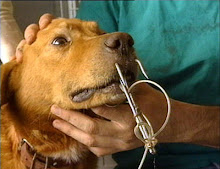he U.S. Food and Drug Administration released today an update on its investigation into pet illnesses and deaths associated with jerky pet treats from China. The update includes a description of the extent of the agency’s testing and current findings, as well as a “Dear Veterinarian” letter and Fact Sheet for pet owners.
The “Dear Veterinarian” letter to veterinary professionals explains how they can provide valuable assistance to the agency’s investigation, requests that veterinarians report to FDA any cases of jerky pet treat-related illness that come to their attention and, when requested, that they also provide samples for diagnostic testing by the Veterinary Laboratory Investigation and Response Network (Vet-LIRN), a network of veterinary laboratories affiliated with FDA. The Fact Sheet for pet owners lists steps they can take to prevent or detect illness related to the treats.
As of September 24, 2013, FDA has received more than 3000 complaints of illness related to consumption of chicken, duck, or sweet potato jerky treats, nearly all of which are imported from China. The reports involve more than 3600 dogs, 10 cats and include more than 580 deaths.
FDA continues to caution pet owners that jerky pet treats are not required for a balanced diet. The agency encourages pet owners to consult with their veterinarian prior to feeding treats and if they notice symptoms in their pets.
The rate of complaints associated with jerky pet treats dropped sharply after several well-known brands were removed from the market in January 2013, when a study conducted by the New York State Department of Agriculture and Marketing (NYSDAM) detected low levels of antibiotic residues in those products. FDA believes that the drop in complaints is linked to a decrease in the availability of jerky pet treats rather than the low levels of antibiotics found in January, which FDA believes are unlikely to be the cause of the illnesses. However, FDA is performing an evaluation to determine the possibility for low levels of the antibiotics to cause illness in dogs when fed over a length of time. This process involves review of the scientific literature, as well as any adverse event reports and consumer complaints sent to the FDA in connection with dogs and sulfonamide drugs, and may take many months to complete. In the meantime, our investigation continues to evaluate all potential causes for illness from the jerky pet treats.
While FDA has not yet identified a cause for the reported illnesses, the agency, together with our Vet-LIRN partners, continue to perform testing to help identify cases and examine both animal tissue and product samples associated with the cases. FDA also continues to work with the manufacturers and distributors of the treats and China’s Administration of Quality Supervision, Inspection and Quarantine to investigate potential sources of contamination or causes of illness in pets.
If you have a dog or cat that became ill after eating jerky pet treats, the Food and Drug Administration (FDA) would like to hear from you or your veterinarian.
While FDA has not yet identified a cause for the reported illnesses, the agency, together with our Vet-LIRN partners, continue to perform testing to help identify cases and examine both animal tissue and product samples associated with the cases. FDA also continues to work with the manufacturers and distributors of the treats and China’s Administration of Quality Supervision, Inspection and Quarantine to investigate potential sources of contamination or causes of illness in pets.
If you have a dog or cat that became ill after eating jerky pet treats, the Food and Drug Administration (FDA) would like to hear from you or your veterinarian.
The agency has repeatedly issued alerts to consumers about reports it has received concerning jerky pet treat-related illnesses involving 3,600 dogs and 10 cats in the U.S. since 2007. Approximately 580 of those pets have died.
To date, FDA’s Center for Veterinary Medicine (CVM) has conducted more than 1,200 tests, visited jerky pet treat manufacturers in China and collaborated with colleagues in academia, industry, state labs and foreign governments. Yet the exact cause of the illnesses remains elusive.
To gather even more information, FDA is reaching out to licensed veterinarians and pet owners across the country. "This is one of the most elusive and mysterious outbreaks we've encountered," says CVM Director Bernadette Dunham, DVM, Ph.D. "Our beloved four-legged companions deserve our best effort, and we are giving it."
In a letter addressing U.S. licensed veterinarians, FDA lists what information is needed for labs testing treats and investigating illness and death associated with the treats. In some cases, veterinarians will be asked to provide blood, urine and tissue samples from their patients for further analysis. FDA will request written permission from pet owners and will cover the costs, including shipping, of any tests it requests.
Meanwhile, a consumer fact sheet will accompany the letter to veterinarians so they can alert consumers to the problem and remind them that treats are not essential to a balanced diet. The fact sheet also explains to consumers how they can help FDA's investigation by reporting potential jerky pet treat-related illnesses online or by calling the FDA Consumer Complaint Coordinator for their state.
What to Look Out For
Within hours of eating treats sold as jerky tenders or strips made of chicken, duck, sweet potatoes and/or dried fruit, some pets have exhibited decreased appetite, decreased activity, vomiting, diarrhea (sometimes with blood or mucus), increased water consumption, and/or increased urination.
Severe cases have involved kidney failure, gastrointestinal bleeding, and a rare kidney disorder. About 60 percent of cases involved gastrointestinal illness, and about 30 percent involved kidney and urinary systems.
The remaining cases reported various symptoms, such as collapse, convulsions or skin issues.
Most of the jerky treats implicated have been made in China. Manufacturers of pet foods are not required by U.S. law to state the country of origin for each ingredient in their products.
A number of jerky pet treat products were removed from the market in January 2013 after a New York State lab reported finding evidence of up to six drugs in certain jerky pet treats made in China. While the levels of these drugs were very low and it's unlikely that they caused the illnesses, FDA noted a decrease in reports of jerky-suspected illnesses after the products were removed from the market. FDA believes that the number of reports may have declined simply because fewer jerky treats were available.
Meanwhile, the agency urges pet owners to be cautious about providing jerky treats. If you do provide them and your pet becomes sick, stop the treats immediately, consider seeing your veterinarian, and save any remaining treats and the packaging for possible testing.



